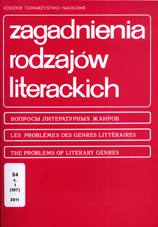Reinventing the Myth of Demeter through Persephone's Suffering and Altruism
Reinventing the Myth of Demeter through Persephone's Suffering and Altruism
Author(s): Catalina-Florina FlorescuSubject(s): Literary Texts
Published by: Łódzkie Towarzystwo Naukowe
Summary/Abstract: In Ngozi Onwurah's short film/documentary The Body Beautiful (1991), Madge, the female protagonist, is in such excruciating pain that, in order to survive, after the birth of her second child, she undertakes mastectomy. Having had a mastectomy immediately after pregnancy is physically and emotionally tiring, and it does not allow Madge to bond with her new-born. Her milk is wasted, drained out of her body. In another example, Marisa Silver's story "Night Train to Frankfurt" (2006), she analyzes the anxious, bitter- sweet filial relationship between a mother-in-pain and her daughter, who are both embarked on a train to a clinic of hope/despair. In some unfortunate cases of extreme physical and emotional breakage, people transact differently their intimate and social spaces. Debilitated by their wounds, these mothers' bodies resemble a series of concentric, yet opaque memories; once they had a body that was whole and beautiful; they used to be capable of an embrace that did not hurt them; and, a long time ago, their uterus was full with growing, vibrant and dividing matter. According to Sue E. Cataldi, "Ueberstieg is a metaphorical expression. It means a stepping over [ ... ] an obstacle. [ ... ] This expression may refer to the way in which Flesh sur-mounts the 'obstacle' of its own occlusion, creates surface recessions, and finds itself within some slack, with some distance on itself - so that it begins to sense itself" (64-5).This concept plays an important role for my essay. But I interpret it against the myth of Persephone. She is the parthenogenetic daughter of Demeter, namely born from an asexual reproduction. Furthermore, Persephone is her daughter and her younger self. Before Persephone is released from the Underworld, Hades tricks her into eating one pomegranate seed. Three quarters a year, mother and daughter are together and nature is in bloom. For one third, nature is spiritless. In my interpretation of the myth, it is Persephone who desperately seeks her mother; and it is the mother who needs to be caressed and embraced, and craves for unconditional love. Here intervenes a type of ueberstieg, a stepping over. Childless, these daughters assume a performance without a script. That is, since these mothers cannot fully offer their maternal affection any longer (e.g., a simple touch could be hurtful; a minimal conversation, exhausting), their daughters become "mothers," in what appears to be a prematurely assigned part. As my article progresses, it reveals the dialogue of the sensual touch, the slippery signs of empathy, and the uncertainty of the dual, reversed attributes between mothers and daughters. The reinvention of the myth of Demeter excavates another major mythical figure, Hades. This essay's Persephones are so intensely moved to see their mothers suffer, that, in a manner of speaking, their lives are literally a living hell.
Journal: Zagadnienia Rodzajów Literackich
- Issue Year: 54/2011
- Issue No: 1
- Page Range: 111-133
- Page Count: 23
- Language: English

